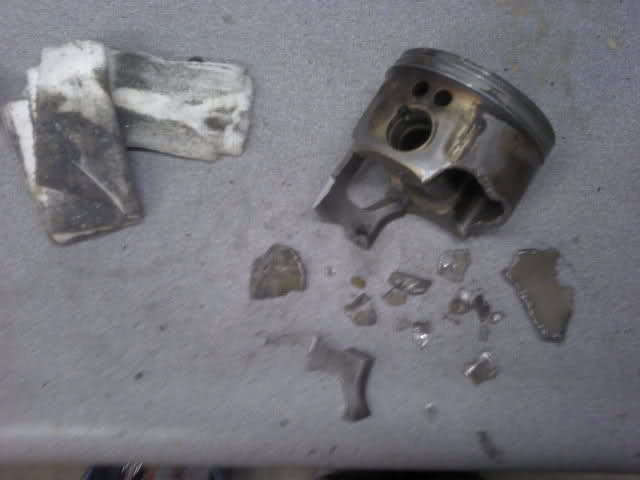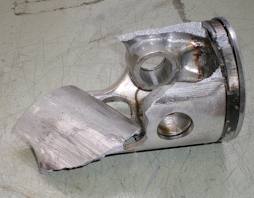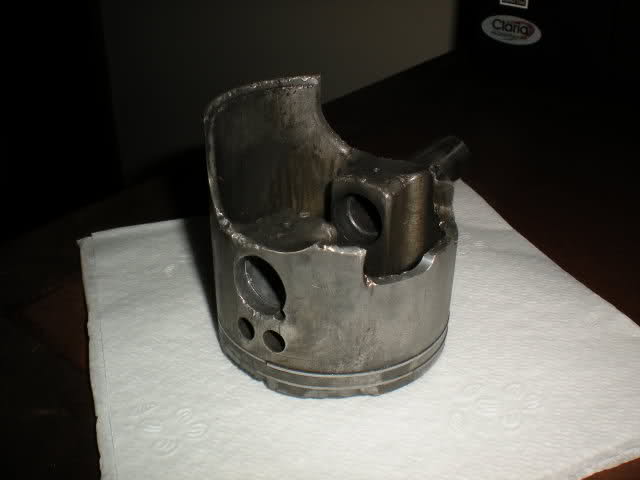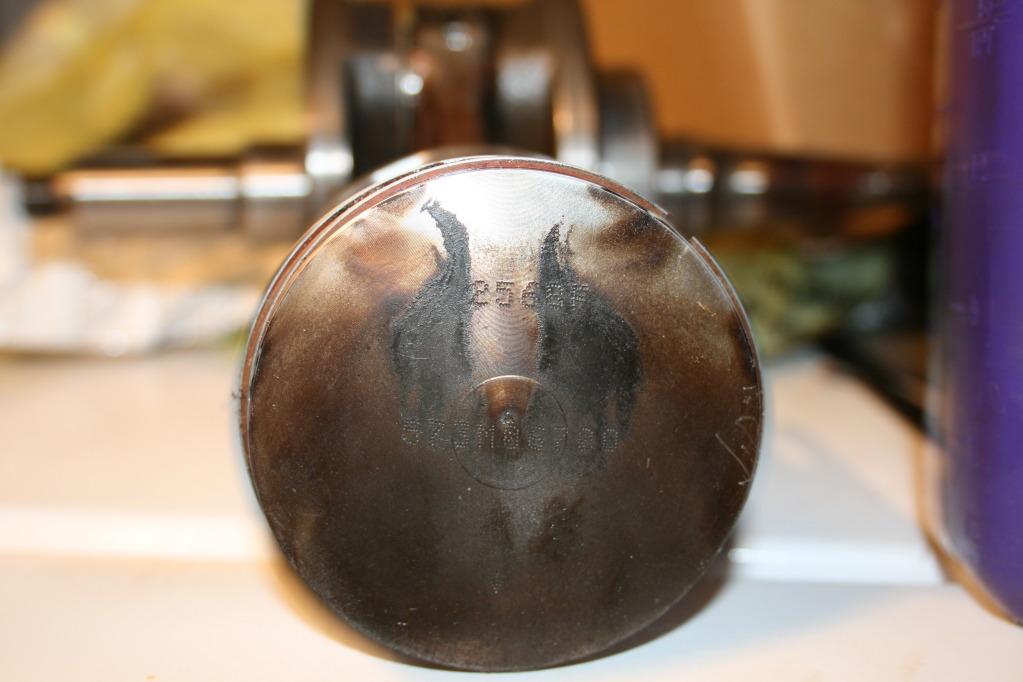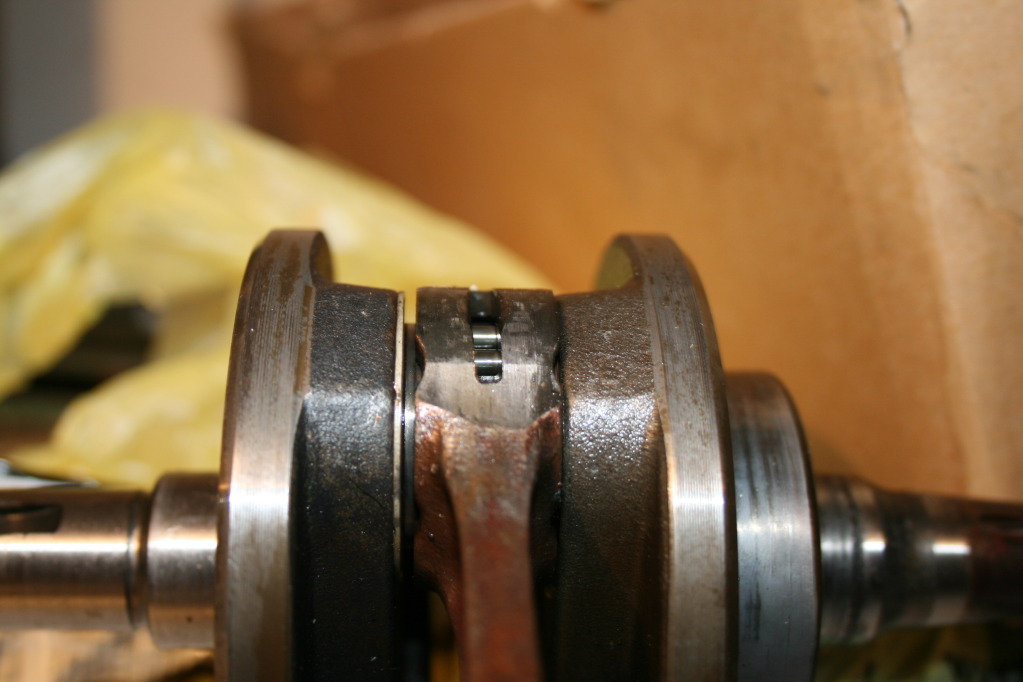Hypereutectic means more than the normal dissolved amount.
Soda water is hypereutectic in that it contains an excess of CO2.
With our aluminum pistons it is silicon, anything over 11% silicon.
I won't try to duplicate the Wiki article above, but build on it.
Forged pistons start out as a cast slug of a softer more malleable aluminum that typically has very little silicon in it, because silicon increases resistance to the deformation that will be needed to shape this cast slug. Forging is a good method for a medium sized manufacturer because a variety of piston sizes and shapes can be made for a significant tooling cost reduction over a precision casting operation. Most of the variety is done with the precision machining. A single bulk slug casting and forging operation can be machined into a wide variety of pistons. Plus the low silicon alloy machines MUCH better than high silicon alloys.
Blaaster can probably add or correct me on any details here, he has a background in piston technology.
Casting pistons uses a different allow that takes advantage of the better thermal expansion, strength, heat and wear resistant values of high silicone alloys. These alloys can vary from very little (2% HYPOeutectic) for diesels and low cost applications, to as much as 25% although most ran pretty close to the 11% before improved casting technology came around to allow higher percentages. Most manufacturers don't readily share their silicon % and alloy composition and heat treatments, and it wouldn't matter much if they did, because it is not as simple as all that. Manufacturers rely on application and reputation to sell their wares. They build a piston for the application as they see fit to, and change the specs and process as they see fit to. This has seen the gradual increase in high silicon and hypereutectic pistons in use as this technology becomes widespread and old production lines are shut down.
So more silicon is better? Why?
It reduces the thermal expansion of the piston, which gets hotter than the cylinder anyway, so tighter clearances can be used. It is not prone to swell up and get stuck in a cold cylinder (heat seize or 4 corner seize). The aluminum is harder and more wear resistant and has a lower coefficient of friction than low silicon alloys. Some engines actually had cylinders of hypereutectic silicon alloy and etched the aluminum away for the piston rings to run on the silicon matrix (grains) in the metal (
Chevy Vega, Porche). The silicon actually increases the strength of the aluminum allow and makes it much more resistant to deformation. Skirts keep their shape and size tolerance better. This does come at the cost of brittleness. And the silicon helps to keep piston strength as you approach the melting point of the aluminum. As temperatures get higher, low silicon alloys will start melting and smearing at the friction points much before a high silicon piston will. The low silicon forging alloy is more prone to welding itself to the bore surface as well.
So why do race teams use forged pistons?
1) More piston shapes are available, due to cheaper manufacturing and machining.
2) Less damaged by engines that run "over the edge" into detonation. Still damaged, but bent, not shattered.
3) Controlled warm up. Cold start seizures can be prevented. Engine built for warm condition.
4) Not concerned about wear life or minute friction advantages. Make big power for a little while.
So why don't performance car and bike manufacturers use more forged pistons?
1) Besides cost, OEM have to meet emission, fuel economy, warranty, and life-cycle targets.
2) Forged piston's wide clearance variation creates emission and economy problems.
3) Forged pistons take special care that will cause noise and warranty issues, and shorter lifecycles.
4) Cast pistons meet all these targets in well designed engines that don't detonate.
I do have a lot of experience with cast-vs-forged pistons in KTM 125 bikes and Sea-Doo's, snowmobiles, V8 engines, turbo and supercharged applications. In the sleds, bikes and SeaDoo the quality cast piston was the hands down winner. Less fuss, longer life, more power. Yes, more power. I run the KTM125 at high constant speeds and I can see the difference.
If you are going to run a 2 stroke engine close to the detonation edge on purpose, by all means run a forged piston if you are willing to do the careful warm ups EVERY time you start up your machine.
If you want "wash and wear", start her up and take off - Cast is your piston.
What about detonation? Don't do it.
Listen to our tips on how to make 30-40 hp without risking detonation and you will have a lot of trouble free miles on cast.
Steve

